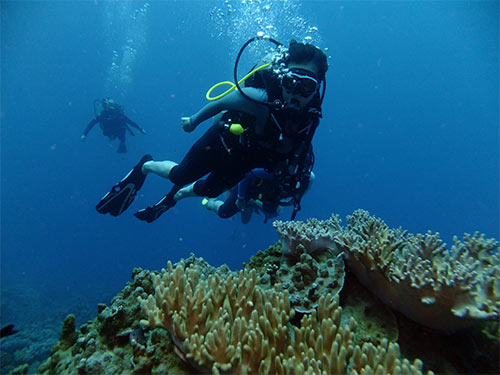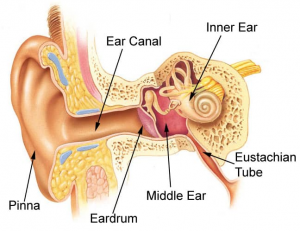Are you nervous about your ears hurting when diving? This is one of the most common concerns with new divers and a fear that keeps people out of the water. This article addresses these concerns and what you can do to prevent ear pain so that nothing will keep you from diving!
What causes ear pain while diving?
As you descend deeper into the water, the pressure increases. It’s this difference in pressure inside the ear vs outside the ear that can cause your ears to ‘pop’ – much like when the pressure changes in an airplane or while driving through the mountains.
To understand why ear pain occurs when diving, it’s important to know the anatomy of the ear. Your middle ears are dead air spaces that are connected by the eustachian tubes. The eustachian tube runs to the back of your throat and is responsible for maintaining balance when there are external pressure changes.
When the pressure in the middle ears fails to match the building pressure around you, pain happens and, in some cases, potential damage to the ear’s delicate structure.
How do I prevent ear pain while diving?
During your Open Water Course, one of the things that you learn is how to equalize and practice techniques that will prevent any ear problems.
At Big Ocean Dive, our instructors teach you how to:
• Equalize properly
• How to ascend and descend slowly
• Safely descend feet first
• Gently push air into those airspaces using a few different techniques
As you go through the course and experience more dives, it’s a practice that becomes second-nature. We recommend equalizing often, keeping your mask clear, and avoiding things that can increase your mucus production before a dive, including alcohol, tobacco, and milk.
Final thoughts
If you dream of learning to dive and explore the ocean, but you have concerns about ear pain, past sinus problems, or fear of the open water, we’re here to help. One of the best ways to conquer fear is to take action so you can be one step closer to experiencing ocean adventures and the breathtaking underwater world!
Click here to learn more about our Open Water Diving Certification, and don’t hesitate to send us a message to voice your concerns.









